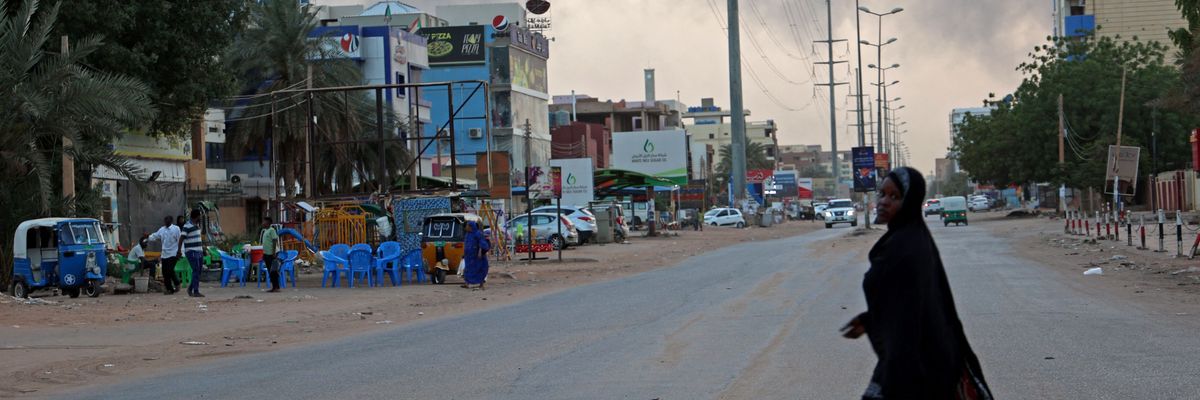As an armed conflict between Sudan's military and a paramilitary group intensifies in the capital Khartoum and surrounding areas, Amnesty International on Monday implored the warring factions to protect civilians and ensure access to humanitarian aid.
Since fighting erupted between the Sudanese Armed Forces (SAF) and the paramilitary Rapid Support Forces (RSF) on Saturday, more than 180 people have been killed and over 1,800 people have been wounded, U.N Newsreported Monday, citing United Nations envoy Volker Perthes.
"The toll could be much higher because there are many bodies in the streets around central Khartoum that no one can reach because of the clashes," The Associated Pressreported. "There has been no official word on how many civilians or combatants have been killed. The [Sudan Doctors' Syndicate] earlier put the number of civilian deaths at 97."
Tigere Chagutah, Amnesty's regional director for East and Southern Africa, said in a statement that "the use of heavy weaponry including artillery, tanks, and jet aircraft in densely populated areas in Khartoum has caused numerous civilian deaths and massive destruction of property."
"Civilians are caught in the middle of this conflict and are suffering," said Chagutah. "The parties to the conflict must immediately stop using explosive weapons with wide area effects in the vicinity of concentrations of civilians."
"Sudan's regional and international partners including the Intergovernmental Authority on Development (IGAD), African Union, U.N., and others should publicly encourage that the parties to the conflict respect international humanitarian law and protect civilians," Chagutah continued. "Both parties must immediately stop their indiscriminate attacks."
He added that "Sudan's authorities and all parties to the conflict must ensure that there is immediate, unrestricted, and sustained access for humanitarian actors to monitor and assess the needs of civilians and to deliver assistance to them."
Combat broke out this past weekend following weeks of tensions between SAF commander Abdel Fattah al-Burhan, chair of Sudan's Transitional Sovereign Council, and RSF commander Mohamed Hamdan Dagalo, or "Hemedti," the council's deputy chair.
The former allies joined forces to take control of Sudan in October 2021, two years after a 2019 military coup that came on the heels of a popular uprising ousted Omar al-Bashir, who had ruled Africa's third-largest country since leading the 1989 overthrow of a democratically elected government. But during recent negotiations for a new transitional government, a dispute arose over security force reform, turning al-Burhan and Dagalo—both of whom have extensive records of human rights abuses, including the brutal repression of pro-democracy activists—into rivals.
"The sudden explosion of violence over the weekend between the nation's two top generals, each backed by tens of thousands of fighters, trapped millions of people in their homes or wherever they could find shelter, with supplies running low in many areas," AP reported. "Even in a country with a long history of military coups, the scenes of fighting in the capital and its adjoining city Omdurman across the Nile River were unprecedented."
Amnesty on Monday urged the U.N. Security Council "to hold an emergency meeting on the situation in Sudan and publicly call on the SAF and RSF to protect civilians as a matter of priority."
According to AP, the council is "set to discuss the crisis" after "top diplomats on four continents scrambled to broker a truce."
Fears of a wider conflagration are mounting as the deadly power struggle spreads "across the sprawling western region of Darfur, where Mr. al-Bashir's government oversaw a campaign of genocidal violence beginning in 2003," The New York Times reported Sunday. "Reports of clashes in the region's major cities and several other towns are especially worrisome because Darfur is home to several heavily armed rebel groups that analysts fear could get sucked into the fight."
A third of Sudan's population—roughly 15 million people—suffer from hunger and rely on humanitarian assistance. However, the U.N.'s World Food Program was forced to halt operations in the country after three aid workers were killed and two others injured in Darfur on Saturday. In addition, the International Rescue Committee and Save the Children have both suspended most operations in the country.
Meanwhile, 12 out of around 20 hospitals in the capital area "have been 'forcefully evacuated' and are 'out of service' because of attacks or power outages," AP reported Monday, citing the Sudan Doctors' Syndicate. "Four other hospitals outside the capital have also shut down."
Citing the World Health Organization, U.N. News noted that "many of the nine hospitals in Khartoum receiving injured civilians are reporting shortages of blood, transfusion equipment, intravenous fluids, medical supplies, and other lifesaving commodities."
In a Monday address, U.N. Secretary-General António Guterres lamented that the country's "already precarious" humanitarian situation "is now catastrophic."
"I strongly condemn the outbreak of fighting that is taking place in Sudan, and appeal to the leaders of the Sudanese Armed Forces and the Rapid Support Forces to immediately cease hostilities, restore calm, and begin a dialogue to resolve the crisis," said Guterres.
"The situation has already led to horrendous loss of life, including many civilians," the U.N. chief added. "Any further escalation could be devastating for the country and the region. I urge all those with influence over the situation to use it in the cause of peace; to support efforts to end the violence, restore order, and return to the path of transition."

